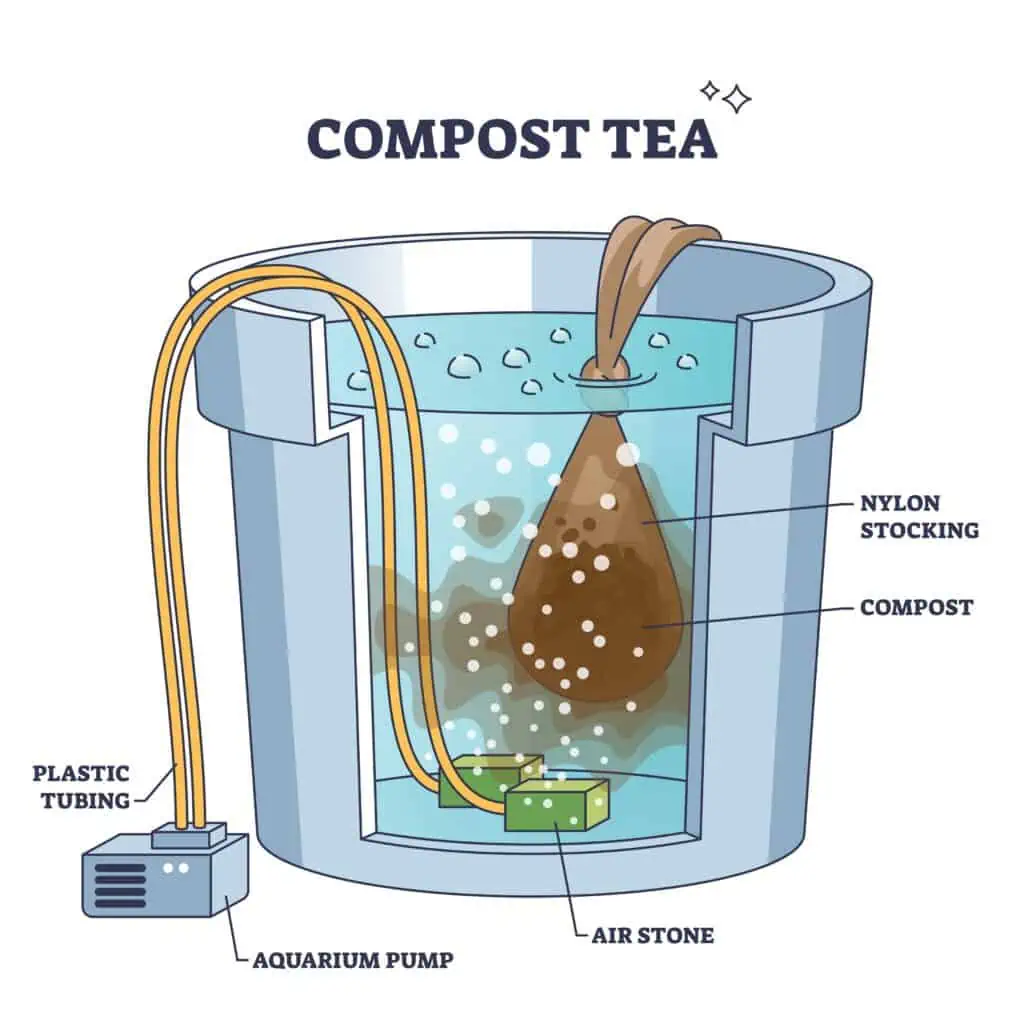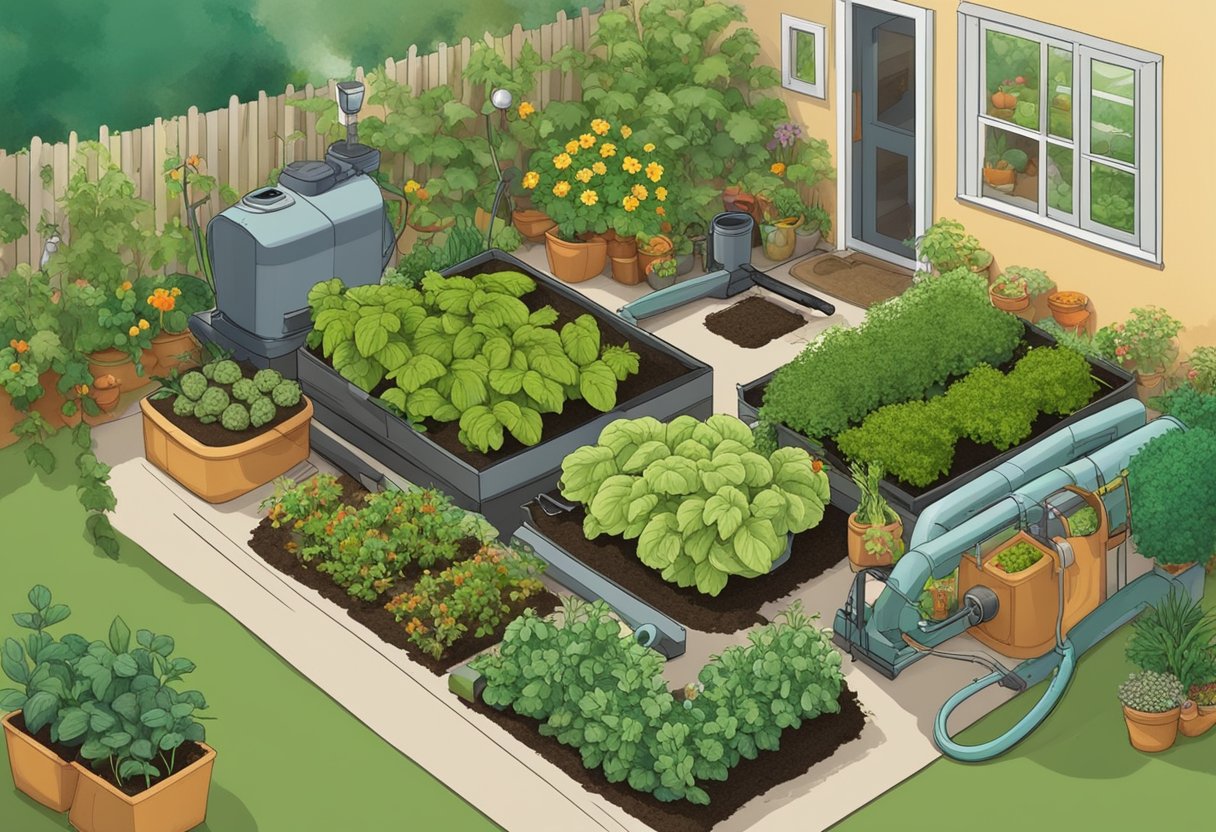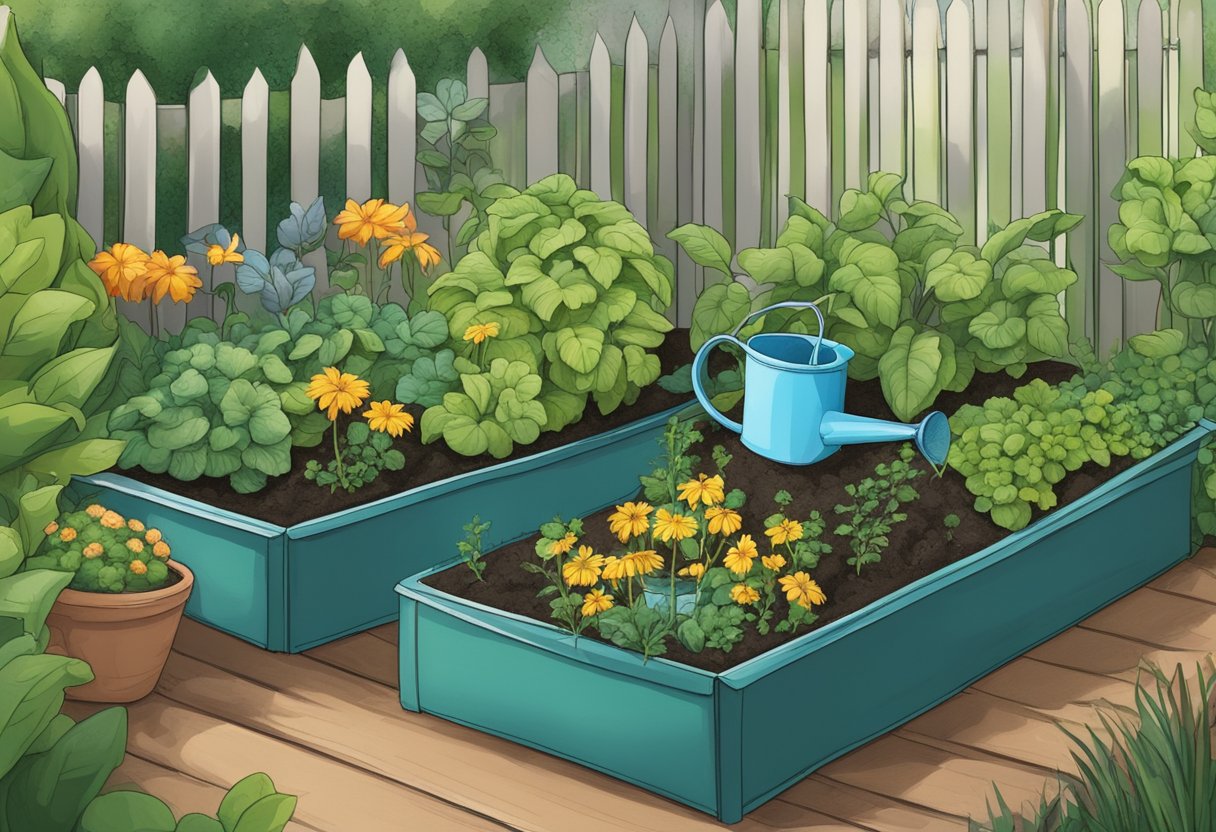As an Amazon Associate I earn from qualifying purchases.
At A Glance
Compost tea is a liquid organic fertilizer derived from steeping compost in water. Applying compost tea to your garden can provide numerous benefits as it is rich in beneficial microbes and nutrients. It can be sprayed on plant leaves as a foliar spray or poured directly onto the soil. As a foliar spray, it helps prevent foliar diseases, promote healthier leaves, and accelerate the decomposition of toxic substances in the soil. When applied to the soil, compost tea improves soil structure, promotes the growth of beneficial soil organisms, and provides plants with essential nutrients.
Compost tea is a popular organic fertilizer that many gardeners swear by. It is a liquid solution made by steeping compost in water, which extracts the beneficial microorganisms and nutrients from the compost. Compost tea can be applied to the soil or sprayed on the leaves of plants to provide a boost of nutrients and beneficial microorganisms.

One of the main benefits of compost tea is that it can improve soil health. The microorganisms in compost tea can help to break down organic matter in the soil, making it more available to plants. This can lead to healthier plants with stronger root systems, which are better able to absorb nutrients and water from the soil. Compost tea can also help to suppress soil-borne diseases and pests, as the beneficial microorganisms in the tea can outcompete harmful ones.
Another benefit of compost tea is that it can provide a quick boost of nutrients to plants. Unlike solid compost, which can take weeks or months to break down and release its nutrients, compost tea can be applied directly to plants and absorbed quickly. This can be especially helpful for plants that are struggling or for those that require a lot of nutrients to grow, such as tomatoes or peppers. Overall, compost tea is a versatile and effective way to improve the health and productivity of your garden.
Understanding Compost Tea

What is Compost Tea?
Compost tea is a liquid fertilizer that is made from steeping compost in water. It is a popular organic gardening technique that has been used for centuries. Compost tea is rich in beneficial microorganisms such as bacteria, fungi, and protozoa, which help to improve soil health and plant growth. It is also a great way to recycle kitchen and yard waste.
Aerobic Vs Anaerobic Compost Tea
There are two types of compost tea: aerobic and anaerobic. Aerobic compost tea is made by adding air to the compost tea mixture, which helps to promote the growth of beneficial aerobic microorganisms. Anaerobic compost tea, on the other hand, is made by steeping compost in water without adding air. This method promotes the growth of anaerobic microorganisms, which can be harmful to plants if used in excess.
Aerobic compost tea is the most commonly used and recommended type of compost tea. It is also known as actively aerated compost tea (AACT). The oxygenation process helps to increase the number of beneficial microorganisms in the tea, which can help to improve soil health and plant growth.
In contrast, anaerobic compost tea can be harmful to plants if used in excess. It can also have an unpleasant odor and may contain harmful pathogens. For this reason, it is recommended that gardeners use aerobic compost tea instead.
In conclusion, compost tea is a great way to improve soil health and plant growth. It is important to use the right type of compost tea, however, to avoid harming your plants. Aerobic compost tea is the most commonly used and recommended type of compost tea, as it promotes the growth of beneficial microorganisms and helps to improve soil health.
Benefits of Compost Tea

Compost tea is a popular organic fertilizer among gardeners and farmers alike. It is made by steeping compost in water and then straining out the solids. The resulting liquid is rich in beneficial microorganisms, nutrients, and other compounds that can help improve soil health and promote plant growth. Here are some of the benefits of using compost tea in your garden:
For Soil Health
Compost tea can help improve soil health in several ways. First, it can increase the population of beneficial microorganisms in the soil, such as bacteria, fungi, and protozoa. These microorganisms can help break down organic matter, release nutrients, and protect plants from harmful pathogens. Second, compost tea can improve soil structure and water-holding capacity, which can help prevent erosion and drought. Third, compost tea can help balance soil pH, which can improve nutrient availability and uptake by plants.
For Plant Growth
Compost tea can also help promote plant growth in several ways. First, it can provide a rich source of nutrients, such as nitrogen, phosphorus, potassium, and micronutrients, which can help plants grow faster and stronger. Second, compost tea can stimulate root growth and development, which can improve nutrient and water uptake by plants. Third, compost tea can help plants resist stress, such as drought, heat, and disease, by strengthening their immune systems and providing them with the resources they need to thrive.
In conclusion, compost tea is a powerful tool for improving soil health and promoting plant growth in your garden. By providing a rich source of beneficial microorganisms, nutrients, and other compounds, compost tea can help create a thriving ecosystem that supports healthy and productive plants.
Brewing Compost Tea
Ingredients Needed
To brew compost tea, you will need the following ingredients:
- Non-chlorinated water (use rainwater, or allow tap water to sit for over 24 hours)
- 1-2 cups of inoculant (either worm castings or compost)
- ¼ – ½ cup of food source for bacteria or fungi
- 5-gallon bucket
- Compost tea brewer or air stones
- Aerating pump
- Stirring device
The Brewing Process
To begin, fill a 5-gallon bucket with non-chlorinated water. Add 1-2 cups of inoculant, either worm castings or compost, to the water. Then add ¼ – ½ cup of food source for bacteria or fungi to the mixture.
Attach air stones to an aerating pump and place it in the compost tea brewer. Dangle the air stones in the compost mixture, making sure that the pump is outside the bucket. Turn on the aerating pump and let the mixture percolate for 12-24 hours.
Stir the mixture occasionally to ensure that the compost is evenly distributed. After brewing, strain the tea through cheesecloth, pouring the mixture into another bucket.
To use the compost tea, apply it to the soil around your plants, either as a drench or a foliar spray. The optimum time of day to apply compost tea is in the morning, when plant stomata are open to receive it and the sun will dry leaves and prevent fungal diseases from excess moisture. Apply when soil is moist if using the product as a drench. For most ornamental plants, spray in late winter to early spring and again when leaf buds break.
It’s important to note that the temperature of the water during brewing should be between 60-80°F. If the water is too cold, the microbes won’t grow as quickly. If the water is too hot, the microbes may die off.
In conclusion, brewing compost tea is a simple process that can provide numerous benefits to your garden. By following these steps, you can create a nutrient-rich tea that will help your plants thrive.
Application of Compost Tea
Compost tea can be applied to plants in two different ways: as a foliar spray or as a soil drench. Both methods are effective ways to fertilize plants and provide them with the nutrients they need to grow and thrive.
Foliar Spray
A foliar spray is a method of applying compost tea directly to the leaves of plants. This method is particularly effective for plants that have a high nutrient requirement, such as tomatoes, peppers, and other fruiting plants. To apply compost tea as a foliar spray, simply fill a spray bottle with the tea and spray the leaves of the plants until they are thoroughly coated. Be sure to spray both the tops and bottoms of the leaves for maximum absorption.
Soil Drench
A soil drench is a method of applying compost tea directly to the soil around the base of plants. This method is particularly effective for plants that have a high nutrient requirement, such as tomatoes, peppers, and other fruiting plants. To apply compost tea as a soil drench, simply pour the tea directly onto the soil around the base of the plants. Be sure to water the plants thoroughly after applying the tea to help it soak into the soil.
Overall, compost tea is a great way to fertilize plants and provide them with the nutrients they need to grow and thrive. Whether you choose to apply it as a foliar spray or a soil drench, you can be confident that your plants will benefit from this natural and effective fertilizer.
Compost Tea Variations
Compost tea can be made from a variety of organic materials, including manure and worm castings. Each type of compost tea has its own unique benefits and uses. In this section, I will discuss two of the most popular types of compost tea: manure tea and worm casting tea.
Manure Tea
Manure tea is made by steeping well-aged manure in water. The resulting liquid is rich in nutrients and microorganisms that can benefit your plants. Manure tea is a great source of nitrogen, phosphorus, and potassium, which are essential for plant growth.
To make manure tea, simply add well-aged manure to a bucket of water and let it steep for several days. The longer you let it steep, the stronger the tea will be. Once the tea is ready, strain out the solids and use the liquid to water your plants.
It’s important to note that manure tea can be high in salts and may not be suitable for all plants. It’s best to use manure tea on plants that require a lot of nutrients, such as tomatoes and peppers.
Worm Casting Tea
Worm casting tea is made by steeping worm castings in water. Worm castings are rich in beneficial microorganisms and nutrients, making worm casting tea an excellent fertilizer for your plants. Worm casting tea is a great source of nitrogen, phosphorus, and potassium, as well as calcium and magnesium.
To make worm casting tea, simply add worm castings to a bucket of water and let it steep for several days. Once the tea is ready, strain out the solids and use the liquid to water your plants.
Worm casting tea is suitable for all plants and can help improve soil health and plant growth. It’s also a great way to introduce beneficial microorganisms to your garden.
In summary, manure tea and worm casting tea are two popular variations of compost tea that can benefit your plants in different ways. Manure tea is a great source of nutrients, while worm casting tea is a great source of microorganisms. Both types of tea can help improve soil health and plant growth when used properly.
Safety Considerations
When using compost tea in the garden, it is important to take certain safety considerations into account. In particular, the risk of disease transmission and exposure to harmful pathogens must be minimized.
Pathogens
Compost tea can contain a variety of pathogens, including bacteria, viruses, and fungi. While many of these microorganisms are beneficial to plants, some can be harmful to humans and animals. For example, Salmonella and E. coli are both common bacteria that can cause serious illness in humans.
To minimize the risk of pathogen transmission, it is important to use high-quality compost that has been properly processed. This means that the compost has been heated to a high temperature to kill off any harmful bacteria or other microorganisms. It is also important to use clean equipment and to avoid cross-contamination with other materials.
Salmonella and E. Coli
Salmonella and E. coli are two of the most common pathogens found in compost tea. These bacteria can cause serious illness in humans, particularly in young children, the elderly, and those with weakened immune systems.
To minimize the risk of exposure to these pathogens, it is important to follow certain safety precautions when using compost tea in the garden. For example, it is important to wear gloves and other protective gear when handling compost tea. It is also important to wash hands thoroughly after using compost tea, and to avoid ingesting or inhaling the tea.
Overall, compost tea can be a safe and effective way to improve soil health and promote plant growth. However, it is important to take certain safety considerations into account to minimize the risk of disease transmission and exposure to harmful pathogens.
